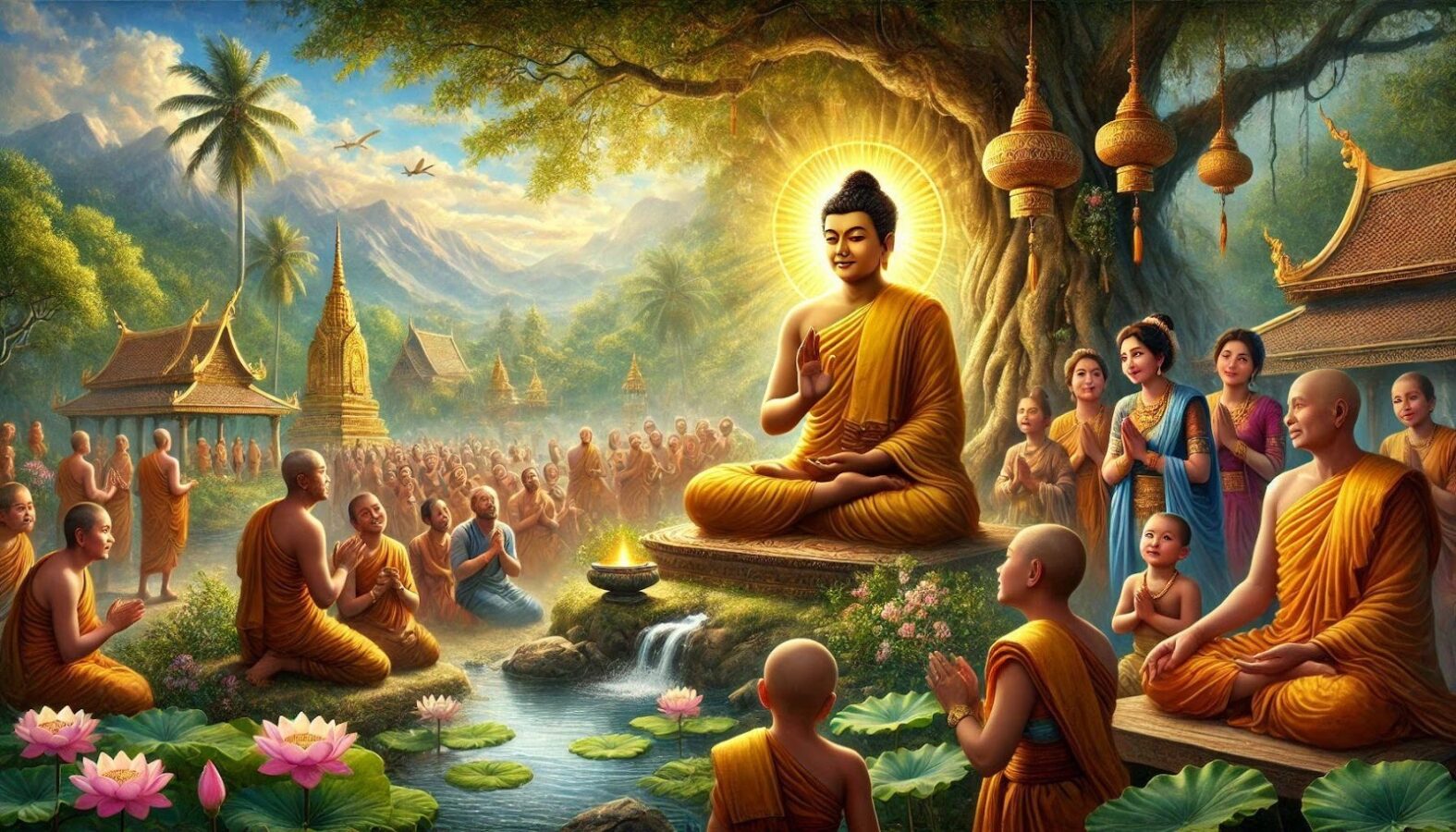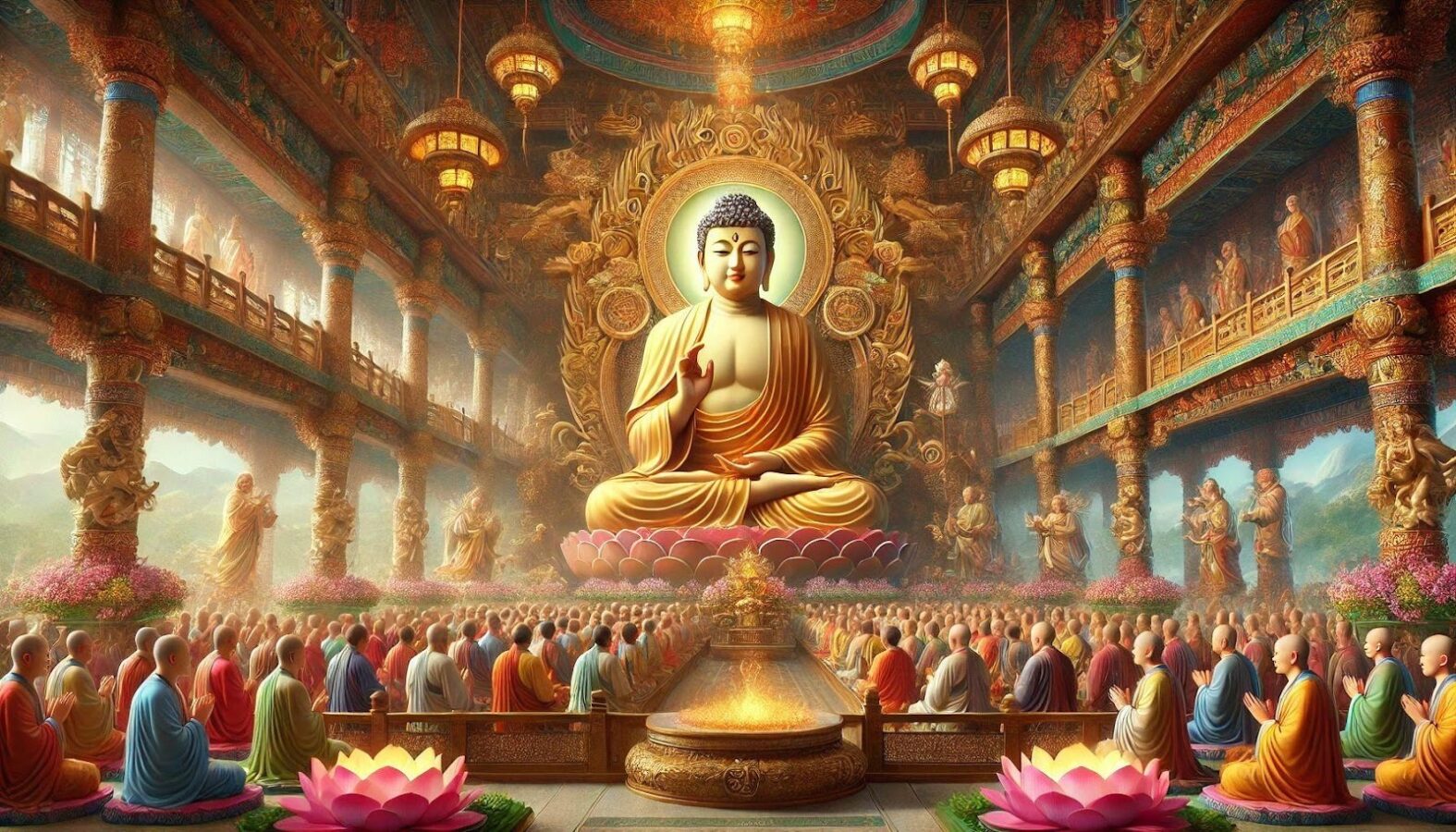
Date: 10/04/2025 10/05/2025
Location: Star Lake Meditation Center
Teacher: Shilin Long
Dharma Talk
Greedy for Profit and Support, Bringing About One’s Own Destruction
Among the disciples of the Buddha there was a monk named Devadatta. He was very intelligent and diligent. For twelve years he practiced all kinds of meditation and attained success. He also observed the twelve ascetic practices, cultivated meditation on impurity and mindfulness of breathing, and reached the stages of warmth, summit, patience, and worldly foremost. He recited sixty thousand sutras, with none who could surpass him. However, as time went by, Devadatta gradually wished to use these attainments to gain wealth and fame. He thought that only by mastering supernatural powers could he make others fear and respect him.
One day, Devadatta came alone to Śākyamuni Buddha. After bowing at the Buddha’s feet, he sat aside and eagerly expressed his wish to cultivate the miraculous power of supernormal abilities, to fly and transform himself in order to travel to other worlds, spread the Dharma, and save beings. The World-Honored One, who already knew his motives, calmly said: “First put down such desires and contemplate the truths of impermanence, suffering, emptiness, and non-self.”
Devadatta thought: “Hmph! You are only afraid that if I gain supernatural powers I will surpass you, so you keep them hidden and refuse to teach me.” Then he left the Buddha and went to Śāriputra, known as foremost in wisdom, to make the same request. Already an Arhat, Śāriputra clearly knew Devadatta’s nature and likewise advised him to contemplate impermanence, suffering, emptiness, and non-self. Devadatta would not listen, proudly thinking: “Śāriputra is praised as foremost in wisdom, but compared to me he is like a firefly before the sun and moon. No one can recite sixty thousand sutras as I can. If even I have not mastered the way of supernatural powers, how could Śāriputra possibly know it?”
A third time, Devadatta went to Maudgalyāyana, foremost in supernatural powers, but was refused again for the same reason. At once he grew angry: “Maudgalyāyana boasts of being foremost in miraculous powers, but he fears that if I master them, his reputation will be lost.” He felt that they were selfish and petty. Not only would they not teach him, but they even told him to think about such “simple truths” as impermanence, suffering, emptiness, and non-self. He felt belittled. Finally, he turned to his younger brother Ānanda. Although Ānanda was learned, compassionate, and virtuous, since he had not yet attained enlightenment, he did not understand Devadatta’s mind and therefore unsuspectingly taught him the steps and methods to cultivate supernatural powers.
With difficulty gaining these instructions, Devadatta retreated to a secluded place and practiced diligently. Relying on his foundation of meditation, his thoughts went from coarse to subtle, then subtle to coarse. His body and mind became unified, gradually rising from the ground, soaring above rooftops, even into empty space. He performed eighteen transformations: fire issuing from his body above while water flowed below; then water above, fire below; disappearing in the east, reappearing in the west; or vanishing in the west, reappearing in the east; multiplying into many forms and then merging into one; walking through walls without obstruction.
Knowing he had succeeded, Devadatta descended from the sky and entered the palace of Prince Ajātaśatru, son of King Bimbisāra. In front of the prince, he transformed into a beautiful child with a face like a peach blossom, solemn and radiant, and leapt into the prince’s lap to be fondled. Ajātaśatru was overjoyed, believing Devadatta greater than even the Buddha his father revered. He rewarded Devadatta daily with five hundred gold pieces, provided endless offerings, and never let him lack for anything.
Many disciples saw Devadatta freely entering the palace, enjoying immense wealth and honor, and they became envious. They went to the Buddha. The Buddha admonished them: “Do not covet such fame and profit. Fame and profit not only ensnare oneself in the net of sin, but also harm others.” He then gave a parable: In the mountains, a vulture told its chicks, “When learning to fly, do not go too high, or strong winds will harm you.” But the chicks ignored the advice, soaring into the sky, and were blown down, their bodies shattered. Likewise, a turtle warned its young, “Do not play carelessly outside. Hunters are watching, ready to catch you with hooks and divide you into five parts.” The young ignored him, played without caution, and when they saw long strings trailing behind them, they did not flee, and many were caught and killed. The Buddha said: “Devadatta, greedy for offerings, is just the same. Creating evil karma, he must reap bitter results.”
To further explain the harm of greed for profit, the Buddha gave another example: “In the past, in the country of the Great Yuezhi, people fed pigs with fresh ghee and cooked barley. A colt in the palace, smelling the fragrance, complained to its mother: ‘We labor for the king, running everywhere without rest, yet our food is tasteless grass. Why is a piglet treated better than us?’ The mare replied: ‘Never think that way. That treatment is a disaster, not a blessing. Soon you will see.’ Later, near year’s end, families seized their pigs and threw them into boiling cauldrons. Their wails were heard far and near. The mother horse then asked her son: ‘Do you still want to eat barley cooked in ghee?’ The colts trembled, and even when offered good grain, refused to eat. The Buddha concluded: ‘Everyone knows Devadatta’s nature. Such offerings do not come from virtue. In the end, they bring endless guilt.’”
Later, Devadatta indeed incited Ajātaśatru to kill his father and seize the throne. He even sought to harm the Buddha and replace him as the new Buddha. He slandered the Triple Gem and caused the Buddha’s body to bleed, committing the five heinous crimes. The earth split open, and he immediately fell into hell.

